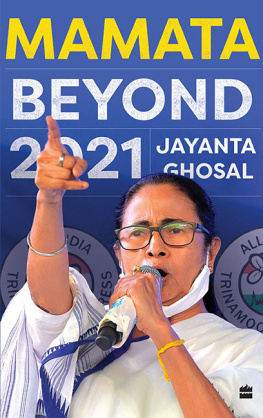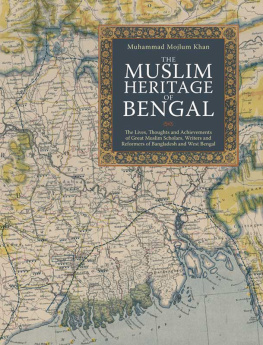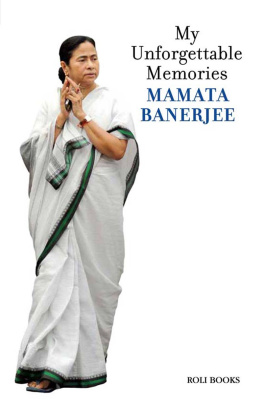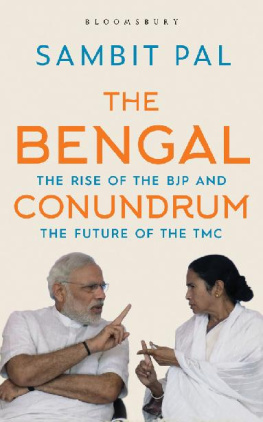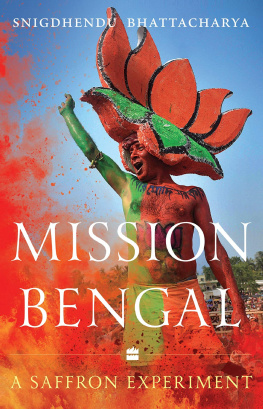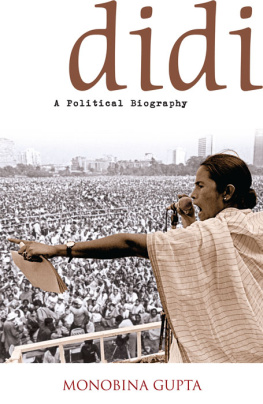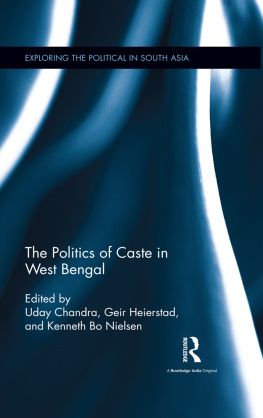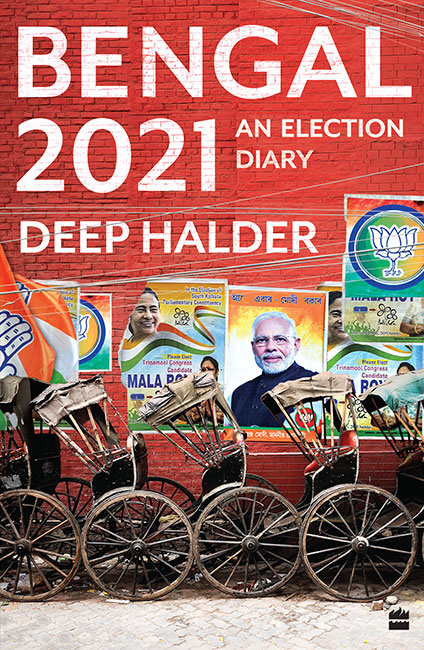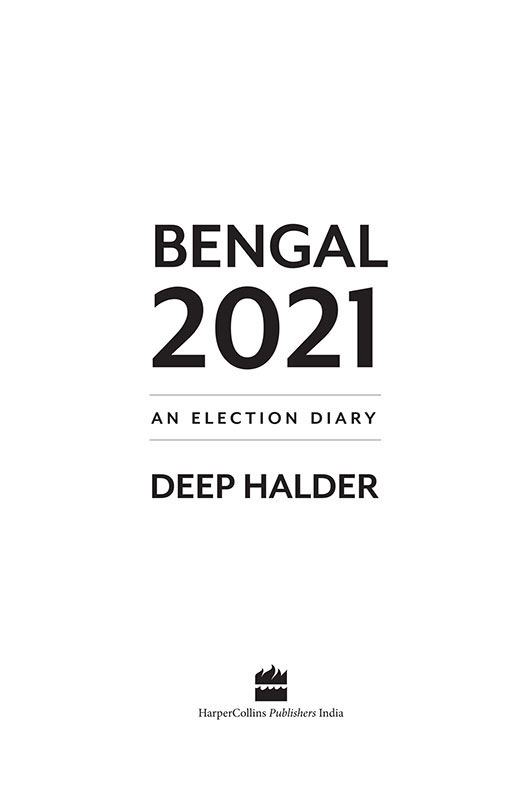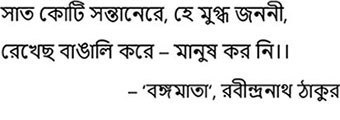O doting mother, your seventy million children
You have kept as Bengalis, but you havent made them men.
Bangamata, Rabindranath Tagore
Contents
1.Bengal Club, Bangal, Ghoti
2.Tollywood Trifurcated
3.Corona as Paash Balish
4.Amphan, After
5.BJP versus BJP in Matua Den, Elsewhere
6.Nusrat Jahan and the Muslim Question
7.Purbo, Paschim, Bankim or Rise of the Right
8.Chotolok versus Bhadralok
9.Law and Disorder
10.Ground Zero Singur
Bengal 2021 is not the Bengal I left behind twenty years ago. In 2001, the year I moved to Delhi, few would have believed that the Left citadel would ever fall in Bengal. One of the Left Fronts more palatable political slogans, meant to taunt Opposition leader Mamata Banerjee, over the years was Dekhe jaa Mamata, kar haat e khomota (Come and see, Mamata, in whose hands power rests). The rest are unprintable. That Mamata Banerjee could rise to power seemed impossible. But then, she did. With a war cry for Poriborton (Change), Banerjee (Didi to followers) became Bengals first woman chief minister in 2011, promising to better the lives of its people, with a government for Ma, Mati, Manush (Mother, Motherland, and the People).
The Left Front had ruled West Bengal for seven consecutive terms from 1977 to 2011, five with Jyoti Basu as Chief Minister and two under Buddhadeb Bhattacharya. And what was Mamata Banerjees plank when she came to power? She replaced a regime that had unleashed a reign of political violence and terror from the massacre of thousands of Dalits in the Sunderbans Marichjhapi island in 1978-79, barely a year after coming to power, right up to the killings and rapes in Nandigram, in East Midnapore, after a failed project to acquire land for a special economic zone in 2007. Mamata Banerjee herself was almost clobbered to death at a political rally on August 16, 1990, by CPM activist Lalu Alam.
But that was not the only thing Mamata Banerjee stood against. After coming to power, the Left Front government had launched Operation Barga, a land reform movement throughout rural West Bengal that gave sharecroppers legal protection against eviction by landlords, and entitled them to the due share of the produce. Ironically, it was the same farming community that Left Front went to war with during the Nandigram agitation and later at Singur when the Buddhadeb Bhattacharya government wanted to give away multi-alluvial farm land to the Tatas to produce the worlds cheapest car Nano. Mamata Banerjee stood with the farmers. Ratan Tata retreated to Sanand in Gujarat. And Buddhadeb Bhattacharya lost power in West Bengal.
West Bengals wait for Poriborton was finally over. Even Lalu Alam, who was being tried by a Kolkata court for attempting to murder Banerjee, cheered her victory. In an interview to India Today on 17 May 2011, Alam said: I am elated that Mamata will become the chief minister. Im innocent. I have been quiet for the last 20 years. It was the Left which targeted me.
Thus began Mamatas reign.
Since 2011, every time I went back to Kolkata to meet my ageing parents, I wondered whether the old Kolkata was giving way to a new city and if my home state was changing for the better. Banerjee had promised she will transform Kolkata into London. She even erected a Big Ben, a 30-metre high replica at the LakeTown main road. The original is nearly three times taller. Her government also went on an overdrive to spruce up the old city with new lights, new flyovers and new names for old roads.
So did Poriborton come?
Over the decade that Mamta Banerjee has ruled the state, this four-word question has been dissected on many news channels, in panel discussions, newspaper columns, op-ed pieces and neighbourhood addas, and has inspired analytical tomes. The 2021 Assembly elections will examine the question once again, during a crucial and unprecedented time and perhaps the elections during a pandemic year will give us a definitive answer.
It is not easy to read the mind of a voter. To read the mind of the Bengali voter is a tougher ask. When Bengali cinema legend Soumitra Chatterjee died on 15 November 2020, the writer and political commentator Sandip Ghose tweeted: Bengalis have always been bipolar East BengalMohun Bagan; Manik (Satyajit Ray)Mrinal (Sen); Uttam KumarSoumitra Chatterjee. Uttam was the star Soumitra the true thespian and quintessential Renaissance man. The last of the Mohicans. RIP #Soumitra Chatterjee.
I agree with Ghose. Not just in their opinions on football teams and cinema, in their political views too Bengalis are bipolar alternating between the Left and the Right ideologies. The Left, of course, has had a long history in West Bengal. Even the extreme Left, the Naxalites, who have rejected parliamentary democracy and picked up the gun against the state, have their origins in the small hamlet of Naxalbari in North Bengal. That is the reason why, in West Bengal and outside, the default image of the Bengali Bhadralok is that of a Leftist. Soumitra Chatterjee himself was a Leftist and wore his political colours on his sleeve, something Bengalis of a certain type did not hesitate to remind Prime Minister Narendra Modi on Twitter when he paid homage to the late actor.
And many would argue that Mamata Banerjees Ma, Mati, Manush brand of grassroots politics has been borrowed heavily from the Lefts playbook.
So, as Bengal readies for an epic battle in 2021, it is interesting to remember the bipolarity of the Bengali mind when it comes to politics. The rise of the Right did not happen overnight with the BJP winning for the first time, eighteen of the forty-two seats in West Bengal in the 2019 Lok Sabha elections, touching an impressive double digit in Bengal for the first time. In the 2014 Lok Sabha elections, the saffron party had managed only two seats from the state.
As impressive as the poll performance was, the Right in Bengal goes back in time to the writings of Bankim Chandra Chattopadhyay (18381894) to the life and times of Syama Prasad Mookerjee, who founded the Bharatiya Jana Sangh, predecessor of the BJP, in 1951. These histories are not talked about often enough, but Bengal was once the fulcrum of Rightist intellectual thought in the country.
In this book, I have tried to examine the rise and spread of the Right in Bengal by speaking to a swathe of peoplefrom those in the BJP headquarters in Delhi to Thakurnagar village near Bengals border with Bangladesh, from the most prominent names in the Right-wing ecosystem on social media to faceless RSS functionaries on the ground (Chapter 7)to debunk the myth that Rightist thought is not inherent to the Bengali mind.
There are three other factors that will play a big part in deciding who will rule West Bengal for the next five years. One of them is the question of Bengali identity itself. Does the BJP pose a threat to the modern-day Bengalis socio-cultural moorings? Is it an essentially non-Bengali party that pushes a somewhat North-Indian version of Hindu religiosity and nationalism at the expense of the Bengali version of secularism and internationalism? If the BJP comes to power in Bengal, will the Bengali be able to freely gorge on mutton biryani during Durga Pujo when Hindus in the north go vegetarian for Navaratri?


